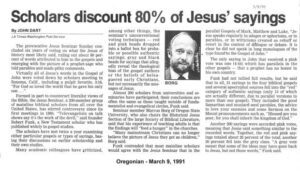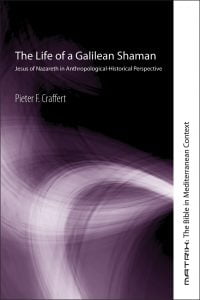We are living in a time of the most immense and relentless attacks on the Christian faith since the beginning of the church dispensation. The present onslaught does not primarily occur on the physical level in order to persecute and torture Christians, but rather on the spiritual and doctrinal level with a view to utterly deceiving them. These assaults constitute a determined and final effort by the kingdom of darkness to completely obliterate the Christian faith and replace it with the Antichrist’s alliance of false world religions.
 The changes brought about by this process of apostatising are so comprehensive that they are paving the way towards a completely new worldview which is known as postmodernism or globalism. What do these changes consist of? During the modern phase in history, and particularly during the great awakenings of the 18th and 19th centuries, the Christian faith exerted a great influence on the mindset and lives of people in the Western world. It formed the basis of the Christian civilisation, when respect for the Bible was demonstrated by way of Christian constitutions, Christian systems of education, Christian morality and various other institutions in society. God’s supremacy was recognised by many people, even though in the majority of cases it was only nominally so.
The changes brought about by this process of apostatising are so comprehensive that they are paving the way towards a completely new worldview which is known as postmodernism or globalism. What do these changes consist of? During the modern phase in history, and particularly during the great awakenings of the 18th and 19th centuries, the Christian faith exerted a great influence on the mindset and lives of people in the Western world. It formed the basis of the Christian civilisation, when respect for the Bible was demonstrated by way of Christian constitutions, Christian systems of education, Christian morality and various other institutions in society. God’s supremacy was recognised by many people, even though in the majority of cases it was only nominally so.
Through postmodern globalism, a major assault is being launched on the foundations and basic principles of the Christian faith. Postmodern man is liberating himself from all faiths or ideologies which impede his freedom of belief or behaviour in any way. The right of free choice is offered to all people of all religious convictions, which gives rise to an all-inclusive form of religious globalism. All people may believe, or decide not to believe, as they please. They can also live as they please, provided they do not harm anybody.
Biblical Christianity is a stumbling block in the way of postmodern reforms since, by not accommodating other faiths and moral codes, it is non-inclusive. It therefore stands in the way of the appearance of a universal, multireligious messiah who will set out to unite the world under his banner of globalism. Because of this, the past number of years has seen a growing movement to overthrow the foundations of the Christian faith. The following five Christian foundations have specifically been targeted in the process of postmodern transformation, usually also in the order in which they are mentioned below:
1. Rejection of the literal interpretation of the Bible
The starting point for the deconstruction of biblical truths is the rejection of the literal, grammatical-historical interpretation of the Bible. In this way, the first seeds of doubt are sown on clear Scriptural statements, particularly with regard to biblical prophecies. In terms of this approach, people take the liberty to reinterpret the Bible  by means of spiritualising and allegorising in order to arrive at any conclusion which appeals to them. The only thing which they consistently do is to reject the literal fulfilment of biblical prophecies as that does not comply with their subjective outlook.
by means of spiritualising and allegorising in order to arrive at any conclusion which appeals to them. The only thing which they consistently do is to reject the literal fulfilment of biblical prophecies as that does not comply with their subjective outlook.
Theologians who spiritualise the Bible refuse to believe that the end-time will be characterised by widespread apostasy (Mat 24:4; 1Tim 4:1), that there will be a great tribulation (Mat 24:21; Rev 6 to 19), as well as an Antichrist who will rule by means of demonic powers and enjoy a worldwide following of worshippers (Rev 13:1-4). Neither do they believe in a literal battle of Armageddon in which Christ will destroy His enemies (Rev 16:13-16; 19:19-21), nor in a literal millennial reign of peace after the second coming of Christ (Rev 20:4-6).
Instead of this scenario those who deviate from the literal interpretation proclaim world peace, ecumenical unity and prosperity for all. Not only do they deny the fact of divine judgements in the end-time, but go further and even deny the existence of the devil and hell, as well as eternal condemnation in the lake of fire. Many other biblical pronouncements are also subjected to pragmatic reinterpretation. The result of this approach to the Bible is an ever-increasing doctrinal diversity in Christian churches, in which each one proclaims and follows its own teachings. To a lesser or larger degree they all deviate from the truth, since there is only one central truth in the Bible.
The moment when biblical prophecies are shrouded in mystery and robbed of their primary meaning, the way is opened to also relegate other Scriptural teachings to different and downgraded levels of application. In this way people take the liberty of imposing their own views on the Bible in order to avoid unpleasant realities. Hence they start building another kingdom and completely lose sight of the future kingdom which will be revealed by Jesus Christ after His second coming.
2. The rejection of sanctification as a further work of grace
The biblical command on holiness is the next Christian foundation which is rejected within the process of apostatising. A life of self-mortification, filling with the Holy Spirit, and the observing of strict moral standards is not  acceptable to postmodern man. By not allowing him to arbitrarily turn away from God’s Word, this “restrictive” life thwarts his freedom to act according to his own will and insights. The teaching of sanctification, which was strongly proclaimed during revival times (also in South Africa under the ministry of Andrew Murray), is now commonly questioned and even outright rejected.
acceptable to postmodern man. By not allowing him to arbitrarily turn away from God’s Word, this “restrictive” life thwarts his freedom to act according to his own will and insights. The teaching of sanctification, which was strongly proclaimed during revival times (also in South Africa under the ministry of Andrew Murray), is now commonly questioned and even outright rejected.
When the command to holiness (1Pet 1:15-16; Eph 5:18) is ignored or explained away, only repentance is proclaimed – nothing more. The consequences of such a situation are well described in 1Cor 3. Although most of the members of that congregation were born again believers they were “babes in Christ” who were described as carnal – not at all spiritual (1Cor 3:1-4). The most important characteristics of their conduct were envy, strife and divisions, as well as changing doctrinal preferences. They were spiritually so ignorant and without depth in their religious experience that they did not even realise that their bodies were temples of the Holy Spirit, and that they should have lead holy lives (1Cor 3:16-17).
The same situation prevails today in churches where repentance is still proclaimed, but without any emphasis on sanctification or clear teachings on biblical prophecies. Such Christians do not have a definite future expectation, neither the power nor the motivation to prevail against sin, fleshliness and worldliness. No wonder that many believers, particularly the youth, are losing interest in such churches and then drift away from the truth even further.
3. Rejection of the command to be born again
In congregations where the prophetic word in the Bible does not carry any weight, and where the command to sanctification is not seriously considered, an ideal breeding-ground prevails for the falling of the next Christian foundation, i.e. the command to repent and be born again. That is precisely what is to a great extent happening today.
 In many churches, false foundations are offered to people as a basis of salvation. These foundations range from good works to church membership and ritualising through sacraments, as well as the deceptive assumption that all who are predestined for heaven are already spiritually alive at their birth or since infant baptism, and consequently do not have to repent at all.
In many churches, false foundations are offered to people as a basis of salvation. These foundations range from good works to church membership and ritualising through sacraments, as well as the deceptive assumption that all who are predestined for heaven are already spiritually alive at their birth or since infant baptism, and consequently do not have to repent at all.
When this situation prevails, a congregation reduces itself to the level of an organisation devoid of any spirituality, being only nominally Christian. They are characterised by a mere form of godliness in which the regenerating power of the Holy Spirit is denied (2Tim 3:5). Such people regard themselves as Christians, but they have no testimony of being born again at a time when the Lord has changed their hearts and lives.
In this condition of the spiritual darkening of their minds, church members are ready and also susceptible to the overturning of the two most basic foundations of the Christian faith, i.e. the authority of Scripture as the Word of God, as well as the deity and atoning death of the Lord Jesus Christ.
4. Rejection of the Bible as the inspired Word of God
Church members who only have a form of godliness do not enjoy the benefit of the Holy Spirit dwelling in their hearts and giving them enlightened eyes of the mind to understand the mystery of the gospel (Eph 1:18). Most of them are victims of the theology of spiritualising and therefore do not seriously regard biblical truths at face value. Because of their lack of rebirth and sanctification, they cannot understand biblical truths which are spiritually discerned (1Cor 2:14).
 Because of this situation, the members of seriously apostatised churches do not have the knowledge to resist and refute postmodern textual criticism. They are easy victims of the New Reformation’s premises that the Bible was written by people in terms of the primitive worldview of their time, that it contains many mistakes and contradictions, and is also filled with mythology and imagery which cannot be seriously regarded. To them, the Bible is on the same level as the holy books of other religions, and definitely not a unique revelation of God to humanity.
Because of this situation, the members of seriously apostatised churches do not have the knowledge to resist and refute postmodern textual criticism. They are easy victims of the New Reformation’s premises that the Bible was written by people in terms of the primitive worldview of their time, that it contains many mistakes and contradictions, and is also filled with mythology and imagery which cannot be seriously regarded. To them, the Bible is on the same level as the holy books of other religions, and definitely not a unique revelation of God to humanity.
Under such circumstances there is no commitment to the authority of Scripture; consequently, postmodern Christians see themselves as completely free to determine the nature of their own lives and to observe their own moral principles. Ritualising by means of baptising is regarded to be sufficient for salvation, which leads to the disposition that everything which may be described as evangelical or fundamentalist is rejected as unacceptable narrow-mindedness.
5. The rejection of Christ’s divine attributes and atonement
The fifth and most important foundation upon which the Christian faith rests is the Rock, Jesus Christ, with specific reference to His virgin birth, deity, atoning death, bodily resurrection and ascension. He is the Word that became flesh – the incarnated God who dwelt among us. When the Bible is no longer recognised as the inspired and inerrant Word of God, it is obvious that Jesus Christ will no longer be regarded as the perfect God-Man. Consequently, Christianity is no longer to be viewed as unique and therefore relegated to an equal level with the other world religions.
It is important to determine how far the deconstruction of Jesus has progressed in apostatised churches and how members are reacting to it. This practice doubtlessly constitutes treason against the true Christ, and that includes confessing Christians who continue identifying with a church in which these heresies are condoned and accepted without protest. The Lord Jesus says that if we deny Him for who He is, He will also deny us: “Whoever denies Me before men, him I will also deny before My Father who is in heaven” (Mat 10:33). Nobody will remain unaffected when treason of this nature is committed as he will be responsible for the eternal damage inflicted to his own soul.
true Christ, and that includes confessing Christians who continue identifying with a church in which these heresies are condoned and accepted without protest. The Lord Jesus says that if we deny Him for who He is, He will also deny us: “Whoever denies Me before men, him I will also deny before My Father who is in heaven” (Mat 10:33). Nobody will remain unaffected when treason of this nature is committed as he will be responsible for the eternal damage inflicted to his own soul.
It is in the interest of all of us to determine to which degree this important foundation of the Lord Jesus as the only Saviour of the world is accepted or questioned in the circles in which we move. We are confronted by a direct choice between the Jesus of the Bible and the so-called “historical Jesus” who is presented to us by agnostic theologians. The true Jesus is the eternal, self-existent Son of God who was conceived by the Holy Spirit when He was incarnated. The “other Jesus” who is the product of speculative theological reasoning and doubtful historical interpretations, was an ordinary man who was not supernaturally conceived, was not God, did not die to atone for our sins and did not rise from the grave.
 The end-time attack against the central Figure of our faith obtained considerable momentum since the Jesus Seminar was founded in America in 1985 by 150 critical scholars under the leadership of Robert Funk. According to their findings, the Bible is not credible as it presents to us an imaginary Jesus who is far removed from the Jesus who really existed. They maintain that the historical Jesus was not God and had no supernatural attributes. The Jesus Seminar does not only attack biblical views on Jesus but also entirely rejects the concept of the Trinity. What they believe in will bring about the end of the Christian faith as expounded in the Bible. The following are a few of their statements on Christianity:
The end-time attack against the central Figure of our faith obtained considerable momentum since the Jesus Seminar was founded in America in 1985 by 150 critical scholars under the leadership of Robert Funk. According to their findings, the Bible is not credible as it presents to us an imaginary Jesus who is far removed from the Jesus who really existed. They maintain that the historical Jesus was not God and had no supernatural attributes. The Jesus Seminar does not only attack biblical views on Jesus but also entirely rejects the concept of the Trinity. What they believe in will bring about the end of the Christian faith as expounded in the Bible. The following are a few of their statements on Christianity:
- The doctrine of the atonement – the claim that God killed his own son in order to satisfy his thirst for satisfaction – is subrational and subethical. This monstrous doctrine is the stepchild of a primitive sacrificial system in which the gods had to be appeased by offering them some special gift, such as a child or an animal.
- Jesus did not rise from the dead, except perhaps in some metaphorical sense.
- Prayer is meaningless when understood as requests addressed to an external God for favour or forgiveness since God does not interfere with the laws of nature. Prayer as praise is a remnant of the age of kingship in the ancient Near East and is beneath the dignity of deity. Prayer should be understood principally as meditation – as listening rather than talking – and as attention to the needs of one’s neighbour.
- The Bible does not contain fixed, objective standards of behaviour that should govern human behaviour for all time.
(For more information on the view of the Jesus Seminar, visit www.patheos.com and specifically the section “Unmasking the Jesus Seminar”).
 Various members of the Jesus Seminar visited the theological faculties of South African universities, where they were received with honour and acclamation for their activities. A number of local theologians closely associate with the Seminar’s work of deconstructing the biblical Jesus and constructing an alternative historical Jesus who is a false replacement of the true Jesus. South Africa has, particularly since the turn of the century, become an important arena for the promotion of the historical Jesus. This movement has not only induced the breaking away of an extreme group referring to themselves as the New Reformation, but also prompted an active debate on Jesus within mainstream reformed churches, where a growing number of pastors support the postmodern deconstruction of Jesus and the Bible.
Various members of the Jesus Seminar visited the theological faculties of South African universities, where they were received with honour and acclamation for their activities. A number of local theologians closely associate with the Seminar’s work of deconstructing the biblical Jesus and constructing an alternative historical Jesus who is a false replacement of the true Jesus. South Africa has, particularly since the turn of the century, become an important arena for the promotion of the historical Jesus. This movement has not only induced the breaking away of an extreme group referring to themselves as the New Reformation, but also prompted an active debate on Jesus within mainstream reformed churches, where a growing number of pastors support the postmodern deconstruction of Jesus and the Bible.
The active phase of this debate was initiated in 2001 by the publication of the book Fatherless in Galilee by Prof. Andries van Aarde of the University of Pretoria. Van Aarde describes the Jesus of the Bible as the Jesus of faith, the kerygmatic Jesus (i.e. the Jesus of the gospel), and also the cultic Jesus. According to him, the disciples and apostles have subjectively decided to declare Jesus to be Messiah and God, but the historic Jesus Himself did not do that. He says that the followers of Jesus transformed the Christian faith into a cult, and that the value which they attached to the cross and the resurrection were simply their own ideas. Van Aarde describes the historical Jesus merely as the son of Mary – the same way in which the Koran also presents Him. He alleges that Jesus was an illegitimate child who grew up without a father, hence his fantasies about a heavenly Father.
The views on the unbiblical Jesus advanced by Van Aarde gained substantial support among many theologians as well as ordinary church members. Opposition against this campaign is, among others, offered by a theologically conservative group referring to themselves as Steeds Hervormers (Still Reformed). On 9th March 2012 they made a statement to the press in which they take issue with Prof. Van Aarde’s views in his controversial book, summarising them as follows:
“There was no virgin birth; Jesus did not rise from the grave; Jesus was not part of the Trinity and was only an ordinary human being; Jesus did not die for our sins; Jesus did not ascend to heaven; the miracles of Jesus were only metaphors and did not really happen; Jesus only saw in God a father figure because he probably did not have a father; the significance of Jesus should be reconsidered in the light of the present postmodern secular world as well as the interfaith debates; Jesus was a nobody amongst nobodies; Jesus was a mere illegitimate child and his divinity was only later conceptualised after the analogy of mythological figures in other cultures” (www.steedshervormers.co.za).
 Another publication which sent shockwaves through South Africa and many other countries is a book by Prof. Pieter Craffert of the University of South Africa, titled: The Life of a Galilean Shaman – Jesus of Nazareth in anthropological perspective, published in 2008.
Another publication which sent shockwaves through South Africa and many other countries is a book by Prof. Pieter Craffert of the University of South Africa, titled: The Life of a Galilean Shaman – Jesus of Nazareth in anthropological perspective, published in 2008.
In his book, Craffert says that “the historical Jesus can be seen as a Galilean shamanic figure” (p. 420). He also identifies Moses and Elisha as earlier shamanic figures in Israel. In a review of Craffert’s book, Prof. R.J. Miller (Juniata College, Pennsylvania, USA) says, among others: “In Part Three, Jesus and the shamanic complex, Craffert argues that Jesus can plausibly be seen as a shamanic figure because he (and his group) often experienced altered states of consciousness, such as various visions (e.g., Jesus’ transfiguration and his walking on the sea) and his experiences at his baptism and temptation. Jesus was thought to be possessed by ancestral spirits. … Jesus’ healings, exorcisms, nature miracles (i.e., control of the spirits of nature), and resurrections (recoveries of the spirits of the dead) can all be understood as shamanic activities and thus suggest that Jesus was a shamanic holy man” (http://www.bookreviews.org/).
Although Prof. Miller expresses his admiration for this book, he nevertheless says, “[Craffert’s] inability to tell historical fact from historical fiction surely reduces the power of any historical method.” This is ample proof of the speculative and unscientific nature of historical Jesus research in general. The findings of these “researchers” are not worthy of serious consideration and do not in any way present a credible alternative to the biblical account of historical events.
Reasons for the deconstruction of Jesus
What is the major reason for the postmodern deconstruction, i.e. the breaking down and rejection of the biblical Jesus? That is done with a view to selling out the world to “another Jesus” who comes from the kingdom of darkness. Paul says to a congregation of deceived Christians:
“For I am jealous for you with godly jealousy. For I have betrothed you to one husband, that I may present you as a chaste virgin to Christ. But I fear, lest somehow, as the serpent deceived Eve by his craftiness, so your minds may be corrupted from the simplicity that is in Christ. For if he who comes preaches another Jesus whom we have not preached, or if you receive a different spirit which you have not received, or a different gospel which you have not accepted; you may well put up with it!” (2Cor 11:2-4).
Under the influence of deceiving spirits, many people are becoming followers of another Jesus who is foreign to the Bible. Who is this “other Jesus”? It either refers to the Antichrist himself or to one of his forerunners. John says: “Who is a liar but he who denies that Jesus is the Christ? He is antichrist who denies the Father and the Son. Whoever denies the Son does not have the Father either” (1Joh 2:22-23).
We are either followers of the true Christ or of the false christ – there is no middle way between them. The Lord Jesus told spiritual leaders of the Jews who had rejected Him as Messiah: “I have come in My Father’s name, and you do not receive Me; if another comes in his own name, him you will receive” (Joh 5:43).
Take a clear stand for the truth: do not even in the smallest respect deviate from the true Jesus of the Bible, as that would amount to rejecting one of His divine attributes and denying Him in that regard. By for instance only denying that Jesus was born from a virgin, one would thereby also deny that He was conceived by the Holy Spirit and consequently also the fact that He is the Son of His heavenly Father. If that was true, Jesus would only have been a sinful man who could not, as the perfect Lamb of God, pay the ransom for our sins. People who believe this, have already in their hearts become estranged from the true Christ and are therefore followers of an unbiblical Jesus.
If we do maintain a relationship with the true Christ and resist the antichristian lies, we will escape the Antichrist’s coming reign of terror. Paul says: “For the mystery of lawlessness is already at work; only He who now restrains will do so until He is taken out of the way. And then the lawless one will be revealed, whom the Lord will consume with the breath of His mouth and destroy with the brightness of His coming” (2The 2:7-8).
Just as surely as the true Christ came to the world 2 000 years ago, He will return at the end of the church dispensation to take away His faithful disciples. Just as literal as that will happen, there will also be a literal Antichrist who will be revealed and institute a highly oppressive government for seven years on earth. We are now witnessing the final preparations for his revelation. That is the reason why the true Jesus is brought into disrepute and even outright denied so that the false Jesus may be presented to the world in His place.
It is evident that we are in an advanced stage of the deconstruction of biblical truths, and in that way provision is made for the establishment of the end-time’s postmodern lies. For quite some time now, our generation has experienced how the five important foundations of the Christian faith (as earlier explained), i.e.: 1. the literal interpretation of biblical prophecies; 2. the doctrine on sanctification; 3. the doctrine on rebirth; 4. recognition of the Bible as the inerrant and inspired Word of God; and 5. faith in Jesus Christ as the true God and eternal life (1Joh 5:20), are being destroyed.
 What should we do in view of all the apostatising that occurs around us? King David asked the same question during a time of great resistance against the truth: “If the foundations are destroyed, what can the righteous do? The LORD is in His holy temple, the Lord’s throne is in heaven; His eyes behold, His eyelids test the sons of men. The LORD tests the righteous, but the wicked and the one who loves violence His soul hates. Upon the wicked He will rain coals; fire and brimstone and a burning wind shall be the portion of their cup. For the LORD is righteous, He loves righteousness; His countenance beholds the upright” (Psa 11:3-7).
What should we do in view of all the apostatising that occurs around us? King David asked the same question during a time of great resistance against the truth: “If the foundations are destroyed, what can the righteous do? The LORD is in His holy temple, the Lord’s throne is in heaven; His eyes behold, His eyelids test the sons of men. The LORD tests the righteous, but the wicked and the one who loves violence His soul hates. Upon the wicked He will rain coals; fire and brimstone and a burning wind shall be the portion of their cup. For the LORD is righteous, He loves righteousness; His countenance beholds the upright” (Psa 11:3-7).
We are now in the time of testing before the pouring out of the Lord’s judgements during the tribulation period under the rule of the Antichrist. The Lord is thoroughly purging His threshing-floor before gathering the wheat into the heavenly barn and burning the chaff with fire (Luk 3:17). Are you firmly grounded in the truth, or are you being drawn away by the strong current of deception?
One thing we should know for sure, is that the righteous will be gathered in heaven where they will see the Lord (1The 4:16-17), while the compromisers and wicked people are destined for the wrath of God. To those who have taken refuge with the biblical Jesus and found safety at His feet, there will be pardon and escape because He has already paid the price for our sins. They shall not come into judgement as they have passed from spiritual death into everlasting life (Joh 5:24).
by: Prof. Johan Malan, Mossel Bay, South Africa (December 2012)
www.bibleguidance.co.za





